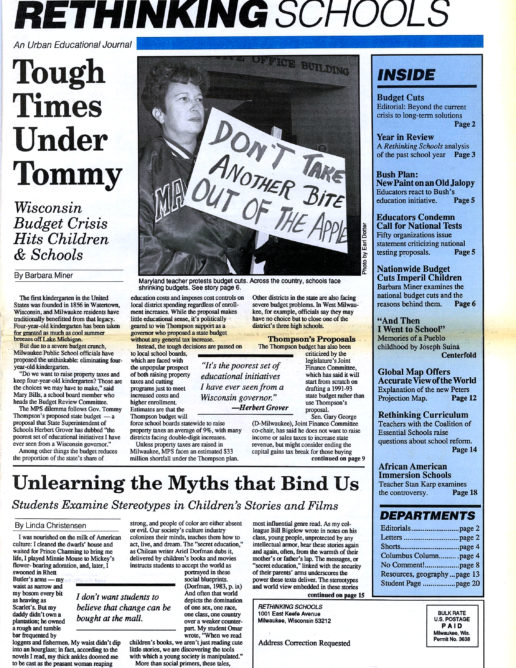Budget Cuts: Slicing and Dicing Children’s Futures
As school budget cuts sweep across the country, tens of thousands of parents and teachers are organizing to protect our children. While we confront this current crisis, we must also reflect on some deeper issues.
No thoughtful person with even a cursory awareness of the state of our urban schools and the growing poverty among children can justify cutting education budgets. In fact, a much larger portion of our tax dollars should be spent on nurturing our children, with a concurrent reduction in the military budget. Unfortunately such realignment of national priorities is unlikely to occur soon, so local activists must deal with local and state budget realities.
One reality is that most school districts, including Milwaukee’s, need to reduce bureaucracy and improve student performance before winning public support for more money for education. For example, the duplication of services that exist between central and “district” offices must be eliminated. Highly paid administrators out of touch with daily life in the classroom must begin to serve the needs of classrooms and local schools. The district must adopt clear goals that recognize the developmental growth of children. Resources and decision-making should be shifted to local school-based councils, permitting teacher and parent initiatives for school improvement.
As these and other necessary changes occur, we believe the public will be more willing to pay for expanded educational programs, reconstruction of our overcrowded schools, and reduction of class size.
School funding must also be made more equitable. Children who live in poorer school districts, with weaker tax bases, should get more state and federal aid. A comparison of suburban and urban (and some rural) schools clearly shows a glaring and unconscionable inequity. A top priority of policy makers must be to overcome this imbalance. It’s noteworthy that many of the businessmen and politicians who are working to curtail state funding to urban schools send their own children to suburban schools with significantly higher per-student expenditures.
Funding for schools, however, must be shifted to taxes that are progressive.
Teacher unions and education advocates must become more vocal in their support of tax justice. Loopholes for the rich must be closed. Tax breaks for businesses must be eliminated. At the same time, as funding sources change from local property taxes to other state and federal taxes, state legislatures and the federal government should not usurp the role of local school boards and school-based councils in determining general school policy.
We believe that people in Milwaukee should not be forced to sacrifice 4-year old kindergartens, interscholastic sports, or reading resource teachers. Instead, we should demand that Gov. Tommy Thompson find the money necessary to fund our schools. His tax policies (as explained on page 9) have benefited the rich while causing the state to lose hundreds of millions of dollars in revenue each year.
Any money saved from administrative cuts, such as the 64 positions Dr. Peterkin suggested be eliminated in late April, should go into programs that support children directly. Obviously, cuts should target programs that do not directly affect our children.
Finally, this wave of cutbacks speaks to the need to develop long range strategies to build a mass political movement, not unlike the civil rights movement, that can challenge the misguided priorities of our national budget. We must link our demands for increased educational funding to improvements in housing, health care, and jobs. Parents and teachers can’t solve our educational problems alone. National problems need national solutions and a national social movement.

